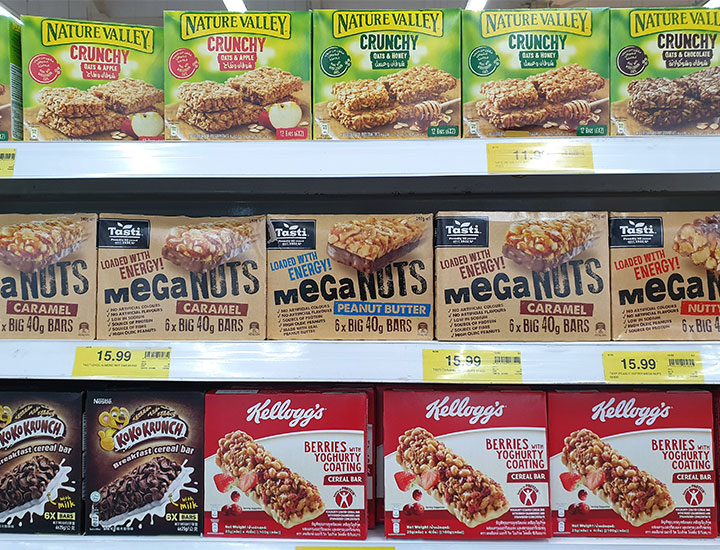
Granola Bars
You may think that grabbing a healthy-looking granola bar on your way out of the door is a good way to fit in a quick, nutrient-dense breakfast when you're crunched for time in the morning. However, health experts say you should think again. These bars typically do your body more damage than they're worth—especially when it comes to your weight.
"Granola bars are the worst 'healthy' food for weight loss because they are full of inflammatory ingredients that prevent weight loss, including refined sugars and grains," Hanks tells us. "Many food manufacturers claim that their granola bars are healthy because they contain oats," she goes on. And while oats are definitely a good source of fiber, the real issue lies in the other ingredients. "The added ingredients in granola bars are what make them so unhealthy," Hanks explains. Typically, the most popular varieties are packed with added sugars, carbs, and calories, which can wreak havoc on your metabolism, worsen inflammation, and result in weight gain.
"While [granola bars] may be convenient they can prevent weight loss efforts, among other negative side effects," Richards agrees, noting that "Processed foods are manufactured with refined carbohydrates that are highly inflammatory and wreak havoc on gut health."
If you're in a rush and want a snack that's equally convenient and nutritious, a granola bar isn't the way to go. Instead, try reaching for healthy nuts and fruits that will keep you energized and satiated—without overloading on the added sugar and calories.
Fruit Juice
Although it may seem healthy because it contains fruit, health experts say that doesn't make it healthy. This is because fruit juice is packed with unnecessary sugar. If you're drinking apple juice every day, this may cause health issues like bloating, inflammation, a ruined metabolism, and weight gain. Yikes!
Long warns about fruit juice that while it may seem like a good choice over soda, "the sugar level in fruit juice might be much higher than the sugar content of soda." Hawkes agrees, "Fruit juices are often packed with sugar," she notes. "For example, there are about 31 grams of sugar in a 12-ounce serving of orange juice, which is more than the 22 grams found in the same amount of cola."
Fruit juice has excessive sugar, but offers almost no nutritional value. "Unlike a piece of fruit, fruit juice contains no fiber to limit the body's absorption of sugar, resulting in an insulin surge," Long says.
Hawkes notes that because fruit juice has very little fiber, drinking too much too often "makes weight loss impossible" because without the fiber it won't keep you full. This can result in overeating and a slowed metabolism. "When you consume such a quantity of the sweet stuff, your levels of blood glucose soar into the stratosphere," she says. "This tells our metabolism to slow down and thus burn fewer calories which leads us towards gaining weight instead." Healthy alternatives for store-bought fruit juice include unsweetened tea, naturally flavored water (this morning flavored water can reduce bloating!), or even freshly squeezed fruit juice.


